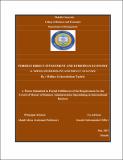| dc.description.abstract | Taking the empirical debates and gaps, the main objectives of this study was to assess the trends and patterns of FDI, to investigate the Short Run (SR) and Long Run (LR) determinants and impacts of FDI on the Ethiopian economy through three basic channels which include real Gross Domestic Product Per capital (GDPP), Human Capital Development (HCD), and Domestic Investment (DI). The study used an Autoregressive Distributed Lag Model (ARDLM) with a Bound Test for Co-integration for analyzing the multivariate time series data which covers from 1992-2012; and Ordinary Least Square (OLS) regression estimations was employed in exploring the SR and LR relationship of the variables specified in 5 econometric equations which all satisfy the different goodness-fit-tests. In addition to this the study used a three stage sampling techniques (purposive, stratified and simple random sampling) and using scientific formula draw 93 FDIs as a sample size of the study. Then the primary data were collected from 76 FDIs through a five stage likerts scale type of questionnaire. Then the study took the triangulation effect of the two findings to strengthen the base of the conclusions it made. The study found that having an increasing trend, the pattern of FDI flow is highly volatile and is highly contracted in the periods of political turbulence mainly in the period of power transitions, in the period of border war and the 2005 national election. In the investigation to determinant the study found that the lagged FDI, DI, trade liberalization, economic growth, infrastructure (telecom and road networks) political stability attract FDI favorably. However the macroeconomic instability (inflation rate and exchange rate), the human capital, market size are unfavorable to attract FDI with some exception in LR and SR dynamics. In analyzing the impact the study found that; the economic power of the nation is not strong to reap the benefits of FDI in the SR, FDI has insignificant effect to HCD but SR negative effect and LR positive effect to both GDPP and DI. Doing on the HCD and creating a vertical integration among the FDIs and DIs, a due revision on the macroeconomic policy are few of the many recommendations forwarded by this study. | en_GB |


